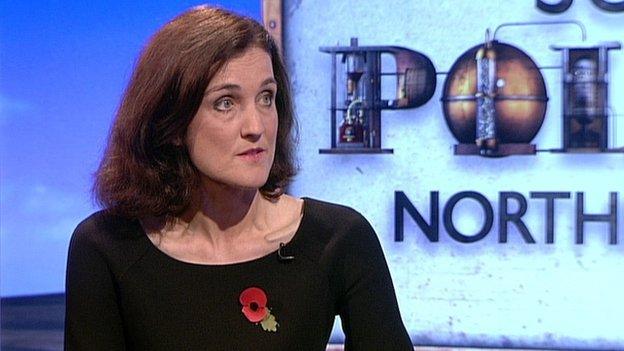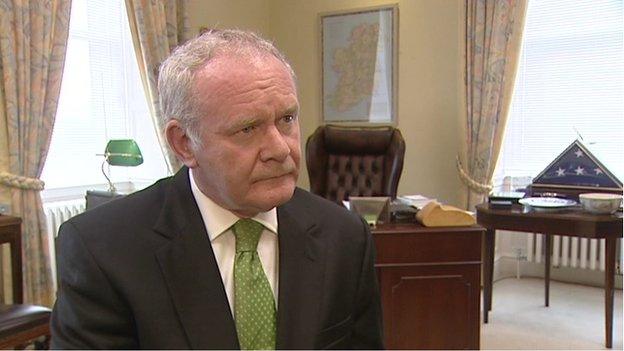Stormont crisis: Theresa Villiers and Martin McGuinness in US talks
- Published

Theresa Villiers is expected to tell US officials that those parties blocking welfare reform are simply putting more strain on the Northern Ireland Executive's finances
Northern Ireland's secretary of state and deputy first minister are taking separate visits to the US to brief the government about the Stormont crisis.
Speaking in advance of their trips, they proposed very different solutions.
Deputy First Minister Martin McGuinness said he would be asking US officials to help convince the UK government to take a new approach to welfare funding.
But Secretary of State Theresa Villiers will say those blocking welfare reform are putting more strain on the budget.
Mr McGuinness travelled to Washington on Monday while Ms Villiers will begin a three-day visit to the US on Tuesday.
'Best hope'
She will update members of the US administration, members of Congress and senior figures in the Irish American community on the current political situation in Northern Ireland.
She said her message during the trip to Washington and New York is that the Stormont House Agreement remains the best hope for building a brighter more secure future.
The agreement, signed by Northern Ireland's five main political parties last December, was a wide-ranging deal that addressed some of Stormont's current financial difficulties, after a reduction in its block grant from Westminster.

Martin McGuinness has appealed to the US administration to intervene and help convince the British government to take a new approach to Stormont's budget
However, Mr McGuinness' Sinn Féin party withdrew its support for the bill in March because of a row over the implementation of welfare reforms.
'Grave situation'
The Sinn Féin MLA is due to meet influential Irish Americans, representatives of the US State Department representatives and other senior US officials.
Speaking on Sunday evening, he said Northern Ireland's political institutions were in an "extremely grave situation".
"The institutions of the Good Friday Agreement, which have underpinned the Irish peace process for almost two decades, are facing crisis," Mr McGuinness said.
He repeated his call for the UK government to change its approach and ensure the institutions are "politically and economically viable and able to meet the needs of a society emerging from a long and bitter conflict".
"It is my hope that the US administration - which has been a key ally since the inception of the peace process - can help convince the British government of the gravity of the current situation and to end their current approach which threatens to undermine the incredible progress we have made," Mr McGuinness added.